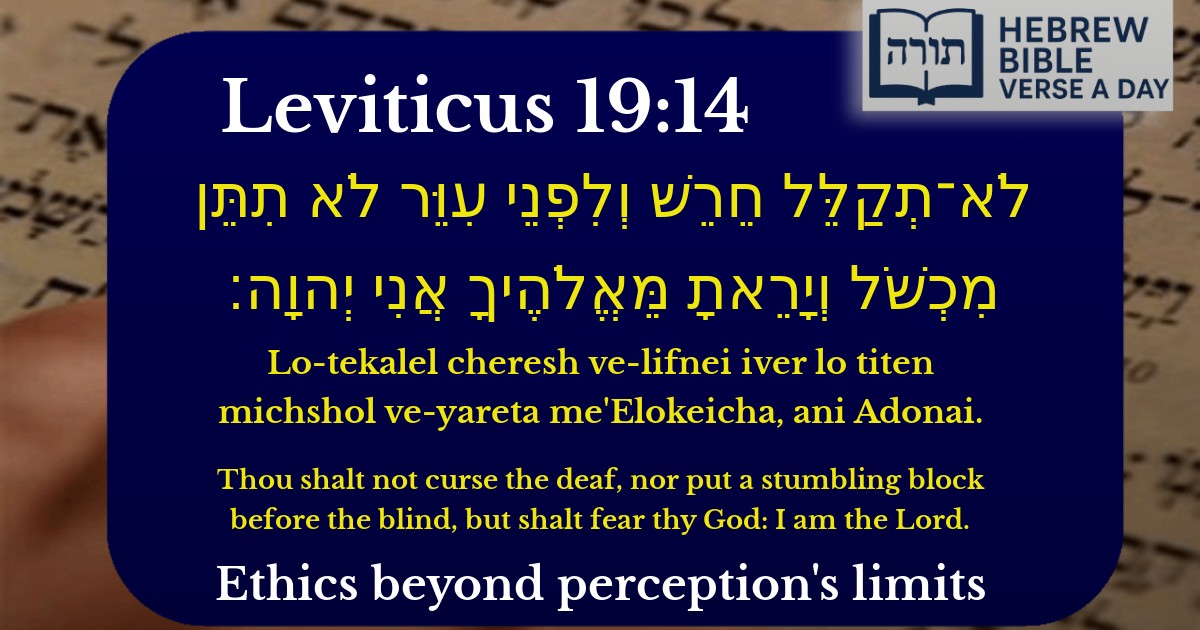Join Our Newsletter To Be Informed When New Videos Are Posted
Join the thousands of fellow Studends who rely on our videos to learn how to read the bible in Hebrew for free!
Hebrew Text
לֹא־תְקַלֵּל חֵרֵשׁ וְלִפְנֵי עִוֵּר לֹא תִתֵּן מִכְשֹׁל וְיָרֵאתָ מֵּאֱלֹהֶיךָ אֲנִי יְהוָה׃
English Translation
Thou shalt not curse the deaf, nor put a stumbling block before the blind, but shalt fear thy God: I am the Lord.
Transliteration
Lo-tekalel cheresh ve-lifnei iver lo titen michshol ve-yareta me'Elokeicha, ani Adonai.
Hebrew Leining Text
לֹא־תְקַלֵּ֣ל חֵרֵ֔שׁ וְלִפְנֵ֣י עִוֵּ֔ר לֹ֥א תִתֵּ֖ן מִכְשֹׁ֑ל וְיָרֵ֥אתָ מֵּאֱלֹהֶ֖יךָ אֲנִ֥י יְהֹוָֽה׃
לֹא־תְקַלֵּ֣ל חֵרֵ֔שׁ וְלִפְנֵ֣י עִוֵּ֔ר לֹ֥א תִתֵּ֖ן מִכְשֹׁ֑ל וְיָרֵ֥אתָ מֵּאֱלֹהֶ֖יךָ אֲנִ֥י יְהֹוָֽה׃
🎵 Listen to leining
Parasha Commentary
📚 Talmud Citations
This verse is quoted in the Talmud.
📖 Pesachim 22b
The verse is cited in the context of discussing the prohibition of placing a stumbling block before the blind, which is interpreted both literally and metaphorically as not misleading those who are unaware or ignorant.
📖 Moed Katan 5a
The verse is referenced in a discussion about ethical behavior and the importance of fearing God in all actions, particularly in dealings with others who may be vulnerable.
📖 Avodah Zarah 6b
The verse is used to emphasize the principle of not causing others to sin, which is likened to placing a stumbling block before the blind.


Prohibition Against Cursing the Deaf
The verse states: "לֹא־תְקַלֵּל חֵרֵשׁ" ("Thou shalt not curse the deaf"). Rashi explains that this prohibition applies even though the deaf person cannot hear the curse, because the Torah emphasizes ethical behavior regardless of whether the victim is aware of the wrongdoing. The Sefer HaChinuch (Mitzvah 231) adds that this teaches us the severity of verbal abuse, as it corrupts the soul of the speaker even if the listener is unaffected.
Stumbling Block Before the Blind
The second part of the verse warns: "וְלִפְנֵי עִוֵּר לֹא תִתֵּן מִכְשֹׁל" ("nor put a stumbling block before the blind"). Rambam (Hilchot De'ot 6:7) interprets this broadly—not only physically causing someone to trip but also misleading others in spiritual or practical matters. The Talmud (Pesachim 22b) extends this to include giving improper advice or enabling sin, as the Sifra (Kedoshim 2:14) states: "Do not cause another to stumble in matters where they lack knowledge."
Fear of Heaven as the Foundation
The verse concludes: "וְיָרֵאתָ מֵּאֱלֹהֶיךָ אֲנִי יְהוָה" ("but shalt fear thy God: I am the Lord"). The Kli Yakar explains that since these sins (cursing the deaf or misleading the blind) may go undetected by others, the Torah reminds us that God sees all. The Ramban emphasizes that true fear of Heaven ensures ethical conduct even when human accountability is absent.
Key Lessons from the Verse